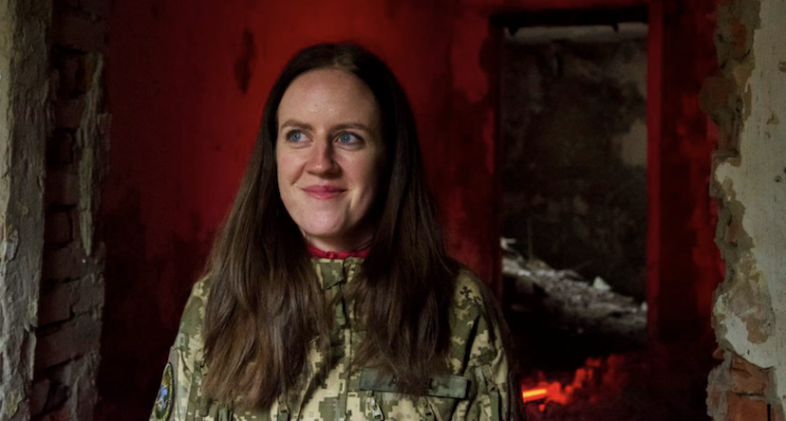Junior Sergeant Aliona Kyrychenko serves as a combat medic in the 32nd Separate Mechanised Brigade, currently deployed in the Kupyansk direction. When her platoon commander was hospitalised, the 23-year-old woman stepped into his role for a month.
“We had just deployed for combat near the village of Synkivka,” recalls Aliona. “We took the platoon commander to the hospital; his deputy was on assignment, and the platoon leaders were still young officers who hadn’t faced enemy fire yet. Then, the chief of staff of our mechanised battalion called me and said, ‘Congratulations, you are now the platoon commander.’ Someone had to step up, and they knew their own guys. So, I rolled up my sleeves and got down to business.”
Before enlisting, Aliona Kyrychenko worked as an ambulance paramedic in Poltava. She opted to join Ukraine’s Armed Forces because her father, brothers, and acquaintances had been defending their homeland since the early days of the full-scale Russian invasion. They mentioned the shortage of medically trained personnel in the military to her. Aliona was eager to make her own mark in securing a future victory.
At the military recruitment office, they promised her a nursing role in a hospital at the rear. But Aliona wasn’t keen on waiting for a peaceful posting. In February 2023, she jumped at the chance to join the newly formed 32nd Separate Mechanised Brigade.
In the brigade, she was swiftly dubbed ‘Angel.’ Even before her first combat mission, she proved to be a true guardian angel for her comrades. Whether assisting with training on the shooting range or handling paperwork, she earned genuine respect. But it was during an evacuation from the front line that her mettle truly shone. Despite her delicate appearance, she fearlessly carried the wounded under enemy fire.
“Having a woman in a combat unit really makes a difference,” Aliona explains. “The lads see that I’m right there enduring everything alongside them, and no one grumbles about the challenges anymore. Although, initially, some tried to suggest I wouldn’t pass the frontline tests. But I always went out on patrols, even under fire. Inside the M113 APC, you’re thrown around, drenched in cold sweat, but you gather yourself and leap out. There’s a whistle overhead, an explosion, and it adds adrenaline – you grab and haul the wounded. And they’re not heavy anymore, and even the body armour doesn’t hinder you,” the heroine smiles. “In reality, the work is akin to providing emergency medical care. It’s just under more extreme conditions. If it’s a minor injury and the lads were picked up by a pickup, then on the move, I try to assess the nature of the injuries. Well, sometimes I bump into the seat when we hit a pothole while speeding.”

Photo: Dmytro Nikishyn
Aliona believes that it’s normal to feel afraid: “It’s worse when there’s no fear; you lose vigilance, and that’s truly dangerous. I always worry the most when the guys go out on a combat mission. I support them with words. And they look me in the eye and say, ‘Commander, we’ll overcome everything together, don’t worry.'”
The positions near Synkivka are nestled in a forest, which makes observation and orientation tricky. Add to that the sandy terrain, and digging trenches becomes a challenge because they constantly collapse. Despite these obstacles, the soldiers remained steadfast in their support of their commander, staying in constant radio communication with Aliona Kyrychenko and maintaining their positions.
“I take particular pride in the platoon, especially after successful assaults,” Aliona reflects. “For example, the boys would each wield an AKS-74U and unleash a barrage of fire, creating a formidable wall. This rifle, with its shortened barrel, packs a louder punch than the standard AK, fooling the orcs into believing we had multiple machine guns at our disposal. There was a moment when Soldier Volkov spotted a grenade landing in our trench, swiftly snatched it, and hurled it out, saving countless lives. Then there were the mornings when Sergeants Troieshchyna, Maliuk, and Shaman would embark on orc-hunting escapades after their coffee. The gleam in their eyes upon returning adorned with trophies is etched in my memory. They casually tossed a pile of documents of slain Russians onto the table, ready to return to their positions in the cold, snowy forest, even after spending multiple days there.”
Next to the table rests a wooden baseball bat emblazoned with the words ‘Olena is always right.’
“This was the doing of my section commanders,” she explains, lifting the bat. “Even our former company commander dubbed us the ‘Kyrychenko platoon.’ From the outset of the brigade’s formation, the higher-ups sensed my commitment to fairness. I consistently advocated for my team with the higher-ups. I closely oversaw operations within the platoon’s command, which likely led them to entrust me with the task of assuming command. I was attuned to the morale and psychological well-being of each soldier. It was inconceivable to me that those who had never faced the front line would be placed in positions without the support of seasoned comrades. The platoon’s sergeant major assisted me in providing the guys with sound advice. I maintained constant communication with the company command, the former platoon sergeant, and the battalion staff. However, the unwavering trust of the personnel was my greatest support.”
Once the platoon commander returned from sick leave, Aliona Kyrychenko shifted her focus to carrying out her usual duties as the unit’s chief combat medic. She remained prepared for fresh challenges in the pursuit of victory and to realize her dream of having a family and children under peaceful skies.

